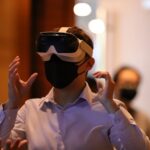More than 2,000 youths from all walks of life – ranging from underprivileged and disabled communities to those from educational institutions such as schools and universities – participated in Microsoft’s YouthSpark #WeSpeakCode campaign, which was held for the second year running in Malaysia. Dubbed “Code for Malaysia” locally, the week-long campaign aimed at helping educators tap into the growing interest of coding.
In doing so, Microsoft Malaysia hosted a range of activities and events from 25 March to 2 April, in collaboration with local schools, universities, government and non-governmental institutions – such as Multimedia Development Corporation (MDeC), The United Nations Children’s Fund (UNICEF), Taylor’s University, MySkills Foundation, and YWCA Kuala Lumpur – to celebrate Code for Malaysia.
This year’s theme centers on inclusiveness, bringing together thousands of young Malaysians from all walks of life and across gender to participate in coding tutorials, lessons and mentoring programs conducted in a fun and engaging manner. Aligned with the theme, Microsoft Malaysia partnered with YWCA Kuala Lumpur and United Nations Children’s Fund (UNICEF) – to extend Code for Malaysia to women and girls, and youths from the underprivileged and disabled communities.
Microsoft Malaysia together with YWCA Kuala Lumpur, conducted a coding session for 70 girls from the underserved community – showing how easy it is to code, at the same time making it relatable and enjoyable for the young people. With UNICEF, Microsoft Malaysia tutored youths from the disabled community to code in only a few hours – demonstrating how simple it was to learn coding – who in turn showed their newfound skills to the delegation from UNICEF’s Executive Board who were present at the event.
Ms. Wivina Belmonte, UNICEF Representative, Malaysia was delighted with the collaboration, “In line with UNICEF’s #disable2enable campaign, we are thrilled to be working with Microsoft for Code for Malaysia – extending work they’ve done with children elsewhere to include children with disabilities. In doing so, it helps us promote the idea that we need to see the child before the disability and create opportunities for children of all abilities to grow, learn and contribute. We hope to multiply this effort in Malaysia and export the idea to other countries in ASEAN and around the world.”
Jasmine Begum, Director of Legal and Corporate Affairs, Microsoft Malaysia said, “Code for Malaysia kicked off last year in Malaysia to resounding success, and we are delighted to continue our efforts to offer resources, education and skills training in coding to more Malaysians. It is important that our young people understand computer science and basic programming are skills that will form the foundation for many jobs in the future. With Code for Malaysia, we are creating real impact in Malaysia, equipping the younger generation with 21st century skills that will propel the country towards our vision of a developed nation by 2020.”
Room for progress: Malaysian students see coding as a core skill, but lack the support
In conjunction with the #WeSpeakCode campaign, Microsoft also released the results from a new Asia Pacific study which revealed that the majority of students in Malaysia recognize the value of coding in their education and the potential it creates for their future careers. However, the study also found that students feel relatively unsupported in their interest for coding, signaling an urgent need for educators to look deeper at integrating it as a core subject in the school curriculum.
The survey – conducted in February 2015 – polled 1,850 students under 24 years old from across 8 countries in Asia Pacific , including Malaysia, on their sentiments towards coding or software programming. They were also asked about the learning opportunities for coding that are currently available to them. The student respondents came from a variety of academic backgrounds, including arts & humanities, STEM (Science, Technology, Engineering, and Mathematics), business, and other general fields of study.
According to the survey, 88% of students in Malaysia want to know more about coding, and 68% wish that coding could be offered as a core subject in their schools. This suggests that coding has the potential to be a highly engaging subject that can capture the attention and imagination of students, leading to positive learning outcomes.
The study also underscores the broad understanding amongst students in Malaysia about the impact of technology on businesses and the society – 74% of students say that coding is important to their future careers, and 72% agree that coding will be relevant to all careers in the future, regardless of areas of specialization.
The results from the Microsoft survey clearly show that the majority of students in Malaysia no longer question the value of coding. “The world is increasingly dependent on technology. In order to reach their full potential, young people need to have an understanding of how technology works, and how to make it work for them. It’s no different in Malaysia – our youth fully recognize the importance of coding as a fundamental 21st century skill and how it would prepare them for success in the future. That is what Microsoft has been doing in Malaysia for more than 20 years – driving innovation and transforming education through technology – to inspire the next generation of Malaysians towards success,” said Dinesh Nair, Director of Developer Experience and Evangelism, Microsoft Malaysia.
“As our world continues its evolution into one that is mobile-first and cloud-first, it is important for educators in the region to seriously consider offering coding as a subject and how it can be integrated into the curriculum as soon as possible. Youth with 21st century skills such as coding will find themselves better qualified for new employment in all areas, not just technology. Remember, it’s in the playing that the learning comes for free.”
Other noteworthy results from the study include :
•On the benefits of coding, 77% said coding helps them better understand the digital world that we live in today, and 58% appreciate the fact that coding can help them learn how to create apps;
•Although commonly regarded as a male-dominated field, the survey nevertheless shows that a high proportion of both boys (90%) and girls (86%) in Malaysia want to learn coding;
•Reinforcing the finding that students in Malaysia are fully aware of the growing importance of an education in technology, as much as 88% of students who specialize in business-related fields want to learn more about coding.
However, despite the widespread enthusiasm and interest in coding, only 52% of students said they have an opportunity to learn coding in school, whether as a core subject or an extracurricular activity. Furthermore, only 44% of students say their parents think coding is important to their future.
Microsoft’s efforts with Code for Malaysia is a step in the right direction – closing the gap between the students’ interest and the support that they are receiving from schools and at home. There is a gradual realization and progress by educators and parents in Malaysia to see how they can better support the younger generation in taking their first coding steps, especially when the majority of students (66%) said they would be willing to take up coding classes outside of regular school hours. In fact, 33% of students in Malaysia have already looked beyond the classroom and picked up coding on their own through online tutorials.
Jasmine concluded, “At Microsoft, we believe that code is a language that anyone can learn and computational thinking is an essential foundational skill that should be taught in all schools – regardless of age, gender, or your current field of study. Writing code and creating a program of your own is not complicated or difficult, and more importantly, it’s fun! More than 82 million people of all ages around the world already tried coding last year through the global “Hour of Code” event. Through the Code for Malaysia campaign, we’re bringing the movement back to Malaysia again to empower youth here to innovate, create, and unlock the best opportunities for their future.”
For more information, news and perspectives from Microsoft Malaysia, please visit the Microsoft Malaysia News Center at http://news.microsoft.com/en-my
###
About Microsoft
Founded in 1975, Microsoft (Nasdaq “MSFT”) is the worldwide leader in software, services, devices, and solutions that help people and businesses realize their full potential.
About Microsoft YouthSpark #WeSpeakCode
In partnership with Code.org, Microsoft Asia Pacific’s #WeSpeakCode campaign aims to promote coding as a language for everyone in the region. The movement connects aspiring student coders of all skill levels with the tools, resources, and experiences they need to turn their innovative ideas into reality. Visit www.wespeakcode.net to find out more.
About UNICEF
UNICEF promotes the rights and wellbeing of every child, in everything we do. Together with our partners, we work in 190 countries and territories to translate that commitment into practical action, focusing special effort on reaching the most vulnerable and excluded children, to the benefit of all children, everywhere.
For more information about UNICEF and its work in Malaysia, visit: www.unicef.my







